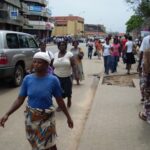Accra, Sept. 29, GNA – Mr Akwasi Opong-Fosu, Acting Head of Local Government Service, on Tuesday said there was the need to treat urban development problems with urgency in order not to perpetuate poverty, undermine social stability and national security.
He cited ‘Sodom and Gomorrah’ in Accra, which represented years of policy and institutional failures overlooked over the years and now aggravated by the advent of urbanization.
Speaking at the first National Diagnostic Forum on Urbanisation in Accra, Mr. Opong-Fosu said Ghana did not do well in her policy on housing and many of the problems of traffic, transport and congestion arose because of the lack of co-ordination and integration between land-use, planning and enforcement of rules. The two-day forum was organized by the Institute of Local Government Studies in collaboration with CHF International, and German Co-operation’s Support for Decentralization Reform for Metropolitan, Municipal, District Assemblies and the academia. It was under the theme, “Operationalising the Urban Agenda – The Role Map to Sustainable Urban Development and Management in Ghana”. Mr Opong-Fosu said Africa was urbanizing at a rate of 1.6 per cent, the highest in the world compared to 0.3 per cent for highly industrialized countries.
He said it was projected that by 2015, over 80 per cent of the world’s population would live in cities. Mr Opong-Fosu said over 90 per cent of this urban expansion would take place in the cities of less-developed countries. He said presently, 13 out of 17 cities referred to as “megacities” with populations of more than 10 million were located in developing countries with Lagos being projected to be third on the table of the world’s largest cities by 2010.
“By 2015, nine more cities are projected to reach megacity status and all of them are in developing countries,” he said. He said that trend posed challenges to urban governance in developing countries especially Sub-Saharan Africa with a meagre average local government revenue per capita per annum of 15.21 dollars compared to 252.22 dollars for Latin America, and 2,763.32 dollars for highly industrialized countries.
Mr. Opong-Fosu commended the organizers for the forum that would give hope for the future of urban management and urged them to ensure it led to better outcomes for the millions of Ghanaians especially the vulnerable in society. Dr Volker Monikes, Programme Manager of GTZ-Support for Decentralization Reforms, said successful decentralization did not depend only on effective planning and well designed service delivery mechanisms, but on the degree by which governments succeeded to give their citizens a feeling of belonging and responsibility for their living environment. He stressed the need to respect the interests and feelings of all and sundry, the potential investment company as well as the slum dwellers.
Ms. Sandrine Mannuel-Cappalle, Country Director of CHF International, said there was the need to identify government actors fully responsible for addressing the urban poverty issues. Other issues are to develop urban local authorities’ capacity combined with civil society empowerment; and facilitate participation and partnership on long term collaboration between citizens, civil society organization, private sector and local authorities.
Source: GhanaWeb












